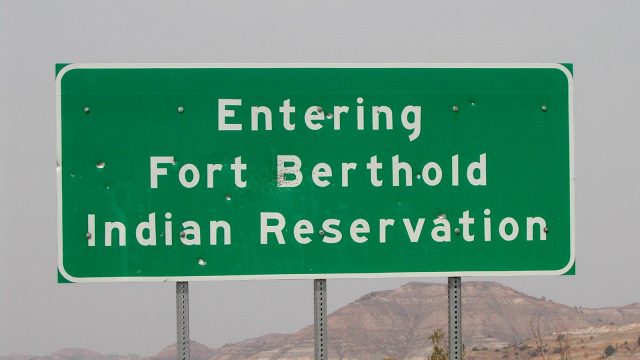What's Really Motivating Tribal Saber Rattling Over Oil Tax Reforms?

The Mandan, Hidatsa, and Arikara Nation – also know as the Three Affiliated Tribes of the Fort Berthold Indian Reservation – are continuing to make noises about withdrawing from what has been an extremely lucrative oil tax deal with the State of North Dakota.
“North Dakota Native Americans hint at exiting state oil tax deal,” is the headline from Reuters reporter Ernest Scheyder, though that’s not exactly breaking news. Tribal leaders have been dropping these hints since lawmakers passed reforms to the oil tax earlier this year.
But I’m wondering if what’s motivating this saber rattling are real concerns about changes to oil tax policy or just posturing ahead of a negotiation for a larger slice of the revenue pie.
Or maybe it’s just plain old partisan politics.
First, let me do some catch up for those of you who haven’t been following along.
A big chunk of the state’s oil production – roughly a third – happens on tribal lands. Prior to 2008, though, almost no oil production was happening there. That’s because the tribe, a sovereign political entity, had its own tax code separate from the State of North Dakota’s and oil companies were loathe to deal with the compliance headache of two taxing regimes. In order to streamline things the state and the tribe struck a deal in 2008 that has the tribe taking a share of what the state collects from oil activity on tribal lands and oil development has been going gangbusters on the reservation ever since.
[mks_pullquote align=”right” width=”300″ size=”24″ bg_color=”#000000″ txt_color=”#ffffff”]Are Democrats leaning on their tribal friends to cause trouble? Or maybe the tribes are just using this as leverage to get a bigger share of tax revenues from the state.[/mks_pullquote]
The unemployment rate on the Fort Berthold Reservation is routinely under 2 percent, while on other reservations in the state it’s as high as 80 percent. In addition to low unemployment rates, at the end of 2013 the tribe there was taking in about $40 million per month in oil tax revenue.
To put that huge amount of money into perspective, the MHA Nation has about 10,249 enrolled members.
The tribe has set up what they call The People’s Fund. According to projections published by the tribe, that fund is expected to be paying out over $11,000 to each tribal member on their 21st birthday by 2030. and over $15,000 by 2034.
In other words, the tax agreement with the state that opened the doors to oil development on the reservation has been a pretty good deal for the tribe overall.
But earlier this year lawmakers reformed the state’s oil taxes. They got rid of a maze of tax cuts triggered by oil prices, and a mess of other exemptions, and replaced it with a flatter and slightly lower overall rate. Starting January 1 the combined oil extraction and production taxes are 11 percent when the price of oil is over $90 per barrel, and 10 percent when it is under $90 per barrel.
The top rate previously was 11.5 percent.
So now both the state and the tribe are getting a lot more tax revenue when oil prices are low and just a little bit less when oil taxes are high.
For some reason some in the MHA Nation leadership think that’s a bad deal. “It’s possible that we may not figure out how to best reach an agreement,” tribal chairman Mark Fox told Reuters.
I cannot fathom why Fox and others would think the oil tax reform is a bad deal. Indeed, as Senator Dwight Cook noted when the reform bill was being debated in the state Senate back in April (video), Fox himself told a legislative committee that he preferred this reform to the status quo which would have created huge revenue uncertainties given the wild projections for oil prices over the next couple of years.
The reforms give both the oil industry and the state certainty when it comes to oil burdens/revenues in exchange for a slight reduction in overall rates.
Democrats and some tribal voices complain that this slight reduction in overall oil taxes is a “doomsday” will cost the state/tribe billions in coming years, but how do they know? Any revenue projection you could possibly calculate is worthless when the window for oil prices over the next year or so is anywhere from $30 to over $100 per barrel.
What both industry and state/tribal government needed from oil tax reform was certainty, and the Legislature delivered it earlier this year. And if the tribes look to break their tax agreement with the state and institute their own code they put at risk the windfall of tax revenue they’re currently receiving.
The industry may simply choose to do far less development on tribal lands.
Which makes me think that what’s motivating the tribes to make headlines about pulling out of the oil tax agreement is politics. There’s no question that the tribes are a key constituency for Democrats, and there’s no question that Democrats want to paint the oil tax reform as a big mistake.
Are Democrats leaning on their tribal friends to cause trouble?
Or maybe the tribes are just using this as leverage to get a bigger share of tax revenues from the state.




